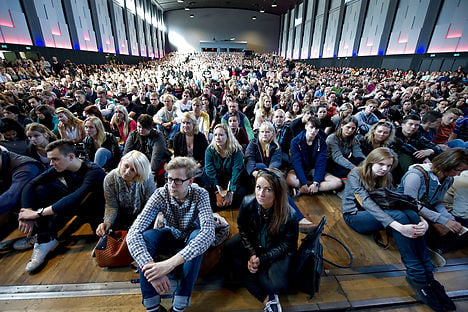RESEARCH
Record number apply for higher education
Well over 90,000 students have sought admission to Denmark's universities. The record number of applicants will find out later this month if they been accepted.
Published: 5 July 2014 21:06 CEST

This was the scene at Aalborg University last year - even more students will be in the hall this autumn. Photo: Henning Bagger/Scanpix
A record number of Danes have applied for acceptance into a higher education programme, the education ministry revealed on Saturday.
Just after the application deadline expired at noon on July 5th, the ministry announced that 91,231 individuals applied for higher education this year.
That represents the highest number ever and a four percent increase over last year’s 88,040 applications.
The minister for higher education and research, Sofie Carsten Nielsen, welcomed the increase.
“We need to use all of the sharp minds and every single set of hands to find solutions to future challenges in areas like health and the environment,” she said. “Denmark will live off of all the innovative ideas and talents of the young people who have applied for a further education.”
In 2012, the Danish government reached its goal of having 60 percent of every year’s high school graduating class continue their education.
This year’s 91,231 applicants will find out on July 30th if they have been accepted to their choice of study. In 2013, 63,525 of the 88,040 applicants got into their chosen field, an acceptance rate of 72 percent.
Url copied to clipboard!


 Please whitelist us to continue reading.
Please whitelist us to continue reading.
Member comments